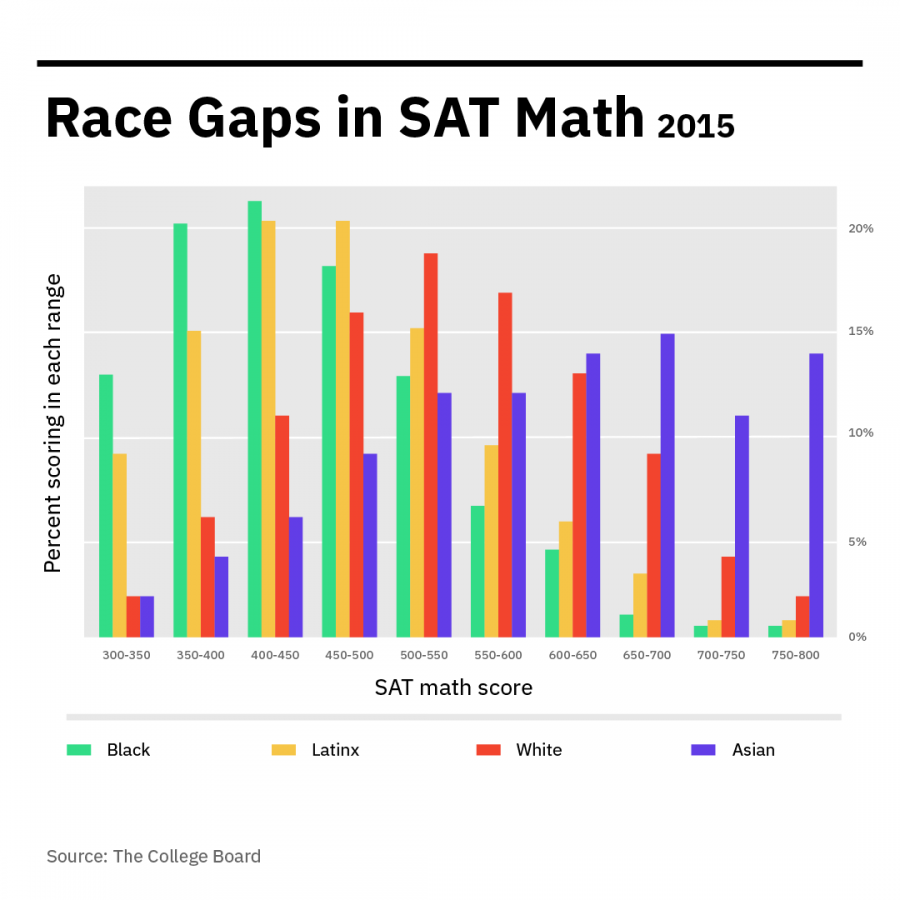Editorial Board: Considering the SAT—the outdated test catered to those with privilege
The SAT has become unequal across races over the years.
March 29, 2021
As Lincoln begins offering the SAT to students again after nearly a year hiatus, we should take this opportunity to consider whether now is the time to curtail standardized testing, or even do away with the system entirely.
The first SAT was administered in 1926 by Carl C. Brigham, a eugenics professor at Princeton University, who essentially developed the test in an effort to divide students by race.
In his book A Study of American Intelligence, Brigham wrote, “American education is declining and will proceed with an accelerating rate as the racial mixture becomes more and more extensive.”
The SAT is used by colleges to compare different applicants, evaluate their college readiness and decide who is most “worthy” of going to their school.
In reality, the test does the opposite. The ability to do well on the SAT comes down to privilege.
For non-native English speakers, the SAT reading and writing sections are significantly more difficult, as the test is currently only offered in English.
In 2018, U.S. census data reported that only 10.1% of white and Asian people are living below the poverty line, compared to 25.4% of Native American, 20.8% of Black and 17.6% of Latinx citizens.
According to a report by the Brookings Institute, which looked at data for all of the nearly 1.7 million college-bound seniors in 2015 who took the SAT, the mean score on the math section of the SAT for all test-takers was 511 out of 800. The average scores for Black (428) and Latinx (457) students were significantly below those of whites (534) and Asians (598).
Among top scorers—those scoring between a 750 and 800—60% were Asian and 33% were white, compared to 5% Latinx and 2% Black. Meanwhile, among those scoring between 300 and 350, 37% were Latinx and 35% were Black.
These numbers are not surprising. Class and race are intersectional. Privileged individuals—typically white, upper class—can easily change the outcome of tests and admissions by forking money over to do so.
The test itself costs $52, and prep courses can cost thousands of dollars. The average cost for an SAT tutor is $45-100 per hour.
For minorities, who are more likely to be low-income or experience poverty, lack of access to these prep courses and tutors has continually resulted in lower scores, leading to further marginalization.
While there are some more affordable options, such as free after-school tutoring or using SAT study guide books (which still cost up to $50), for some students, time is money. Studying long hours for the SAT isn’t practical for students balancing school and a job to support their family, taking care of younger siblings or focusing on sports to ensure a scholarship.
Lower test scores also lead to less opportunity for “merit-based” scholarships, which many students rely on for admission to university. In order to attain these scholarships, one must have a high standardized test score— yet another place for minority groups to fall behind their white counterparts.
The SAT enforces racism and the link between race, income inequality and test scores: more money leads to more success on tests, in turn helping some students get into better schools, giving them the opportunity to acquire better jobs, and the cycle goes on.
As some schools begin to go test-optional because of COVID-19, we are already seeing the positive effects.
A recent study released by the National Association for College Admission Counseling found that, when a test-optional policy is adopted, it does seem to help diversity. Not only is there an increase in applications, but also an increase in the number of racial minorities, women and low-income students admitted.
Another study conducted by Brian M. Galla, a psychology professor at the University of Pittsburgh, suggests that grades are likely a better predictor of college graduation than SAT scores.
The SAT, along with the ACT and other forms of standardized testing, were all developed on similar principles and perpetuate the same classist, racist, privileged ideology. The only way to create an equal playing field for all students is to abolish standardized testing and rebuild our current education system.




